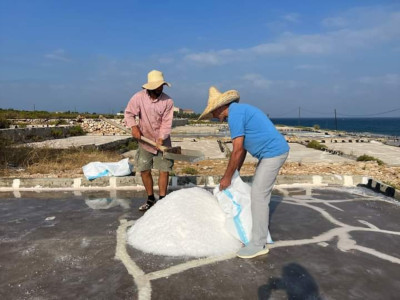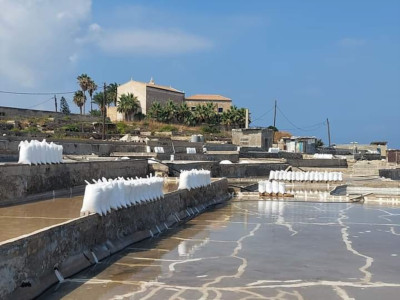Anfeh salt marshes
 Melâhât Anfeh is a traditional coastal salt production that was once popular in Lebanon, but the entirely artisanal practice now survives in just one seaside town, Anfeh, about 70 kilometers (45 miles) north of Beirut. Along with the island of Gozo in Malta, Anfeh has the oldest salt marshes in the Mediterranean basin that are at the heart of the local tradition of sea salt production for centuries and are the hallmark of the town’s identity.
Melâhât Anfeh is a traditional coastal salt production that was once popular in Lebanon, but the entirely artisanal practice now survives in just one seaside town, Anfeh, about 70 kilometers (45 miles) north of Beirut. Along with the island of Gozo in Malta, Anfeh has the oldest salt marshes in the Mediterranean basin that are at the heart of the local tradition of sea salt production for centuries and are the hallmark of the town’s identity.
 In the past, salt pans were laid out on the rocky expanses by the sea, channels dug in the rock allowed water to arrive there. From 1933, they changed their look with the use of concrete to, in small layers, cover the rocks and facilitate the harvesting of cleaner salt.
In the past, salt pans were laid out on the rocky expanses by the sea, channels dug in the rock allowed water to arrive there. From 1933, they changed their look with the use of concrete to, in small layers, cover the rocks and facilitate the harvesting of cleaner salt.
Salt mining is a process subject to the vagaries of the weather, which means it can only be practiced for about four months a year. From the beginning of June to September is the period of the extraction of the salt. First, seawater is sucked into concrete basins one meter deep via pumps powered by small wind turbines. The water sits in ponds up to 20 square meters (over 200 square feet) for at least 20 days, evaporating to leave a salty liquid residue. This salt water is then swept into shallower concrete pans and left to concentrate further for another 10 days. Every day, the salt workers sweep seawater through the pan to ensure that it dries evenly. As the liquid disappears, blindingly white salt crystals emerge in lines.
Prior to the 1970s, Anfeh produced most of Lebanon’s salt. About 70% of local families lived on it. When Lebanon’s 15-year civil war broke out in 1975, salt mining began to suffer a series of setbacks. Many salt pans owners were among the Lebanese who fled in waves over the years of the crushing conflict. With their departure, production began to fall short of demand, prompting the government in the 1990s to lift the import tax on foreign salt.
Nowadays, a few families continue to exploit small plots of salt pans, and the techniques of exploitation are transmitted from father to son. However, this heritage is in danger. The threats hanging over this know-how are many and varied in nature.
The drop in salt production led the government to consider many of the salt marshes to be illegal constructions on the public coastline. Consequently, it stopped taxing income from salt production. Without tax receipts, municipalities began to reject producers’ applications for permits to maintain their equipment. These refusals prevent repairs to the infrastructure, endangering salt mining.
Recently supported by a European Union fund as part of the MedArtSal (Mediterranean Artisanal Salt) project for the sustainable management of Mediterranean artisanal saltworks, four salt marshes have been able to improve the development of their salt marshes. The project also paves the way for them to export their production. Locally, however, salt workers are struggling to sell their goods, because imported salt is still not subject to customs duties. As a result, it is sold at a lower price than Anfeh salt.
Also, the second edition of the International Salt Fair MedArtSal held in Lebanon in June 2023 celebrated the sustainable business model of artisanal saltworks while promoting traditional production methods and preserving biodiversity.
Another danger threatens salt marshes in Anfeh, the construction of a seaside resort and a marina is planned on land belonging to the convent of Our Lady of the Guard (Deir el-Natour). Some salt pans are there. An iron fence, recently installed, delimits the ground where the center should be erected preventing the production of salt.

